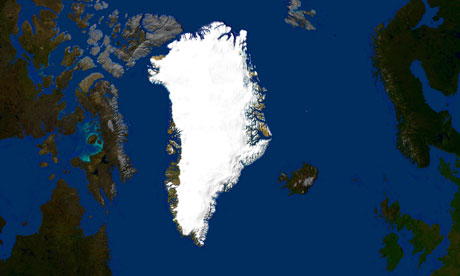Greenland wants $2bn bond from oil firms keen to drill in its Arctic waters
Greenland wants upfront payment to cover major oil spills in wake of BP's Gulf of Mexico disaster

Greenland is demanding that oil companies bidding to drill in huge areas of its Arctic waters each pay an estimated $2bn (£1.25bn) upfront "bond" to meet the clean-up costs from any large spill.
The condition, which is thought to be the first of its kind anywhere in the world, will please environmentalists and could encourage other governments to follow suit in the wake of BP's Gulf of Mexico disaster. Half a dozen energy companies – thought to include Shell, Cairn Energy, Statoil, the Danish companies Dong and Maersk Oil – are in negotiations with the Greenland government about the licensing round, the largest for years.
They are bidding for the right to drill across about 50,000 square kilometres of unexplored waters, much of it in deep water and all in harsh conditions. The government had planned to announce the winners in August, but arguments over the requirement to pay a bond has delayed the process. Intensive negotiations are under way and the winners could be announced as early as next week.
The payment – either in the form of a parent company guarantee for the larger companies or a straight advance – would have to be made once companies were awarded a licence to explore a block. This is despite the fact that actual drilling would not take place for another three or four years because of the mapping and geological preparatory work that would have to be carried out.
Such a requirement could exclude smaller deepwater exploration companies that have less financial clout because they do not bring in their heavyweight partners until they start drilling. Companies that have bigger balance sheets and less deepwater expertise could be favoured in the process. No final decision has been made on the bond payment requirements but it seems likely that it will remain in place, despite some companies' protests.
Negotiations have been complicated by the unpredictable relationship between Greenland and Denmark. Greenland is a self-governing territory of Denmark, which is responsible for its foreign affairs and must sign off on any oil contracts.
The Greenland licensing round, covering the Baffin Bay area off the west coast, has attracted enormous interest – and controversy. BP withdrew from the bidding in the wake of the Gulf disaster, knowing that it was unlikely to win a block given the environmental and political backlash that would have ensued.
No commercial discoveries of oil or gas have yet been made off the coast of Greenland but the industry expects it is only a matter of time before they strike lucky. In 2008, US scientists released a new estimate of 18bn barrels equivalent of undiscovered oil and gas resources in the Arctic circle between western Greenland and eastern Canada.
The remaining bidders are interested in five huge blocks, each one about 10,000 square kilometres. Greenland is also planning two more licensing rounds in 2012 and 2013, which are also likely to prove hugely popular.
Environmentalists are nervous about plans to open up Arctic seas for oil exploration because the cold conditions would make a spill far more damaging. A report by US government scientists concluded that a quarter of the 4.9m barrels of oil estimated to have been spilled in the warm waters of the Gulf of Mexico has evaporated or been dissolved. Oil spilled in the Arctic would not evaporate and would be far harder to disperse and break down.
Sir Bill Gammell, Cairn's founder and chairman, has previously said that while drilling off Greenland was expensive, because of the harsh conditions and distances involved, it was like a "treasure hunt" because one discovery there would be likely to lead to many more.
No comments:
Post a Comment